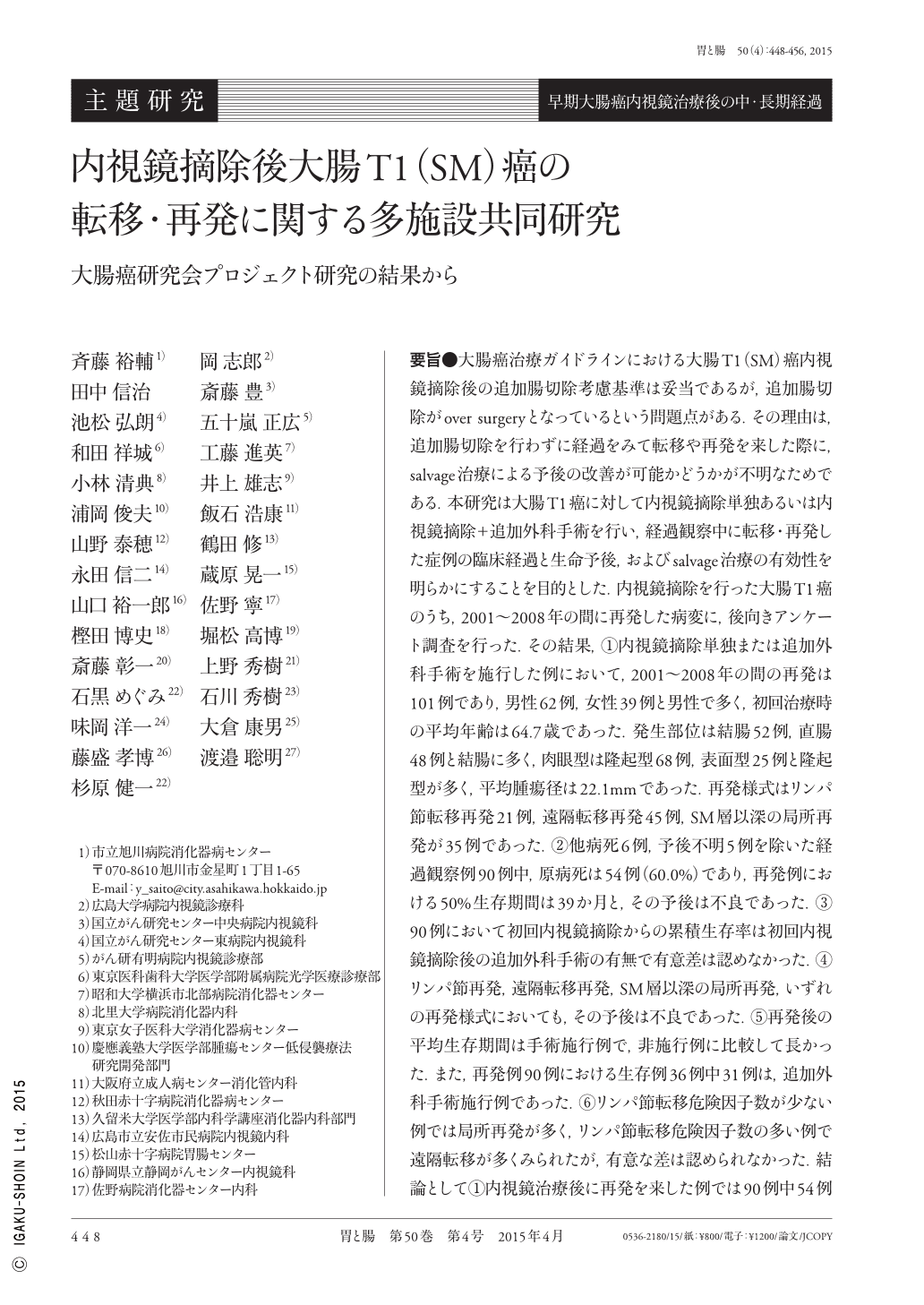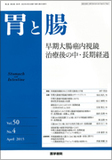Japanese
English
- 有料閲覧
- Abstract 文献概要
- 1ページ目 Look Inside
- 参考文献 Reference
- サイト内被引用 Cited by
要旨●大腸癌治療ガイドラインにおける大腸T1(SM)癌内視鏡摘除後の追加腸切除考慮基準は妥当であるが,追加腸切除がover surgeryとなっているという問題点がある.その理由は,追加腸切除を行わずに経過をみて転移や再発を来した際に,salvage治療による予後の改善が可能かどうかが不明なためである.本研究は大腸T1癌に対して内視鏡摘除単独あるいは内視鏡摘除+追加外科手術を行い,経過観察中に転移・再発した症例の臨床経過と生命予後,およびsalvage治療の有効性を明らかにすることを目的とした.内視鏡摘除を行った大腸T1癌のうち,2001〜2008年の間に再発した病変に,後向きアンケート調査を行った.その結果,(1)内視鏡摘除単独または追加外科手術を施行した例において,2001〜2008年の間の再発は101例であり,男性62例,女性39例と男性で多く,初回治療時の平均年齢は64.7歳であった.発生部位は結腸52例,直腸48例と結腸に多く,肉眼型は隆起型68例,表面型25例と隆起型が多く,平均腫瘍径は22.1mmであった.再発様式はリンパ節転移再発21例,遠隔転移再発45例,SM層以深の局所再発が35例であった.(2)他病死6例,予後不明5例を除いた経過観察例90例中,原病死は54例(60.0%)であり,再発例における50%生存期間は39か月と,その予後は不良であった.(3)90例において初回内視鏡摘除からの累積生存率は初回内視鏡摘除後の追加外科手術の有無で有意差は認めなかった.(4)リンパ節再発,遠隔転移再発,SM層以深の局所再発,いずれの再発様式においても,その予後は不良であった.(5)再発後の平均生存期間は手術施行例で,非施行例に比較して長かった.また,再発例90例における生存例36例中31例は,追加外科手術施行例であった.(6)リンパ節転移危険因子数が少ない例では局所再発が多く,リンパ節転移危険因子数の多い例で遠隔転移が多くみられたが,有意な差は認められなかった.結論として(1)内視鏡治療後に再発を来した例では90例中54例(60.0%)が原病死しており,その予後は不良であった.(2)大腸T1癌内視鏡治療後の再発例において,外科切除可能例では外科切除不能例に比較して生存率の向上,平均生存期間の延長が得られた.
The recommendation for consideration of additional surgery after endoscopic resection for colorectal T1(SM)carcinomas is evaluated to be appropriate by Japan Society for Cancer of the Colon and Rectum(JSCCR)guidelines for the treatment of colorectal cancer ; however, additional surgery is still controversial as over surgery. This is because it is still unclear whether salvage therapy improves the prognosis when relapse or metastasis occur during the follow-up without additional surgery after endoscopic resection. The aim of this project was to elucidate the prognosis and the effectiveness of the salvage therapy in patients with relapse or metastasis during the follow-up after endoscopic resection alone or endoscopic resection with additional surgery. A retrospective questionnaire survey was performed and the results were analyzed for relapse cases during the period of 2001-2008. Results : 1)The number of cases dealt with during the period of 2001-2008, after endoscopic resection alone and with additional surgery were 101. The study comprised 62 males and 39 females whose average age at the initial endoscopic resection was 64.7 years. The location of endoscopic resection was the colon in 51 cases and rectum in 48 cases, macroscopic type was 68 cases of the polypoid type and 25 cases of flat and depressed type. The average size of the lesion was 22.1mm. As for the relapse pattern, cases of lymph node metastasis were 21, those of distant metastases were 45, and those of local recurrences in the deeper part of the submucosal layer were 35. 2)Excluding 6 cases of death due to other diseases and 5 cases of unknown prognosis, deaths due to cancer were seen in 54 cases(60%)among 90 follow-up relapse cases ; for 50% of these, the survival period was 39 months. Thus, prognosis was poor in the relapse cases. 3)In the 90 follow-up cases, there was no significant difference in the cumulative survival ratio between cases of endoscopic resection alone and those of endoscopic resection with additional surgery. 4)Prognosis was poor, regardless of the relapse pattern of lymph node metastasis, distant metastasis, and local recurrence of the deeper part of the submucosal layer. 5)The average survival period after relapse was significantly longer in patients with surgery for the relapsed disease compared with that in patients without surgery. The 36 survival cases reported included patients with surgery for the relapsed disease. 6). Local recurrence was the popular relapse pattern in cases with low risk factors for lymph node metastasis and in those with distant metastasis with high risk factors for lymph node metastasis ; however, no significant difference was seen. Conclusion : As the prognosis was poor in relapse patients after endoscopic resection for T1 cancers, regardless of the relapse pattern, patients with risk factors for lymph node metastasis should be cautiously evaluated for follow-up after endoscopic resection without additional surgery.

Copyright © 2015, Igaku-Shoin Ltd. All rights reserved.


